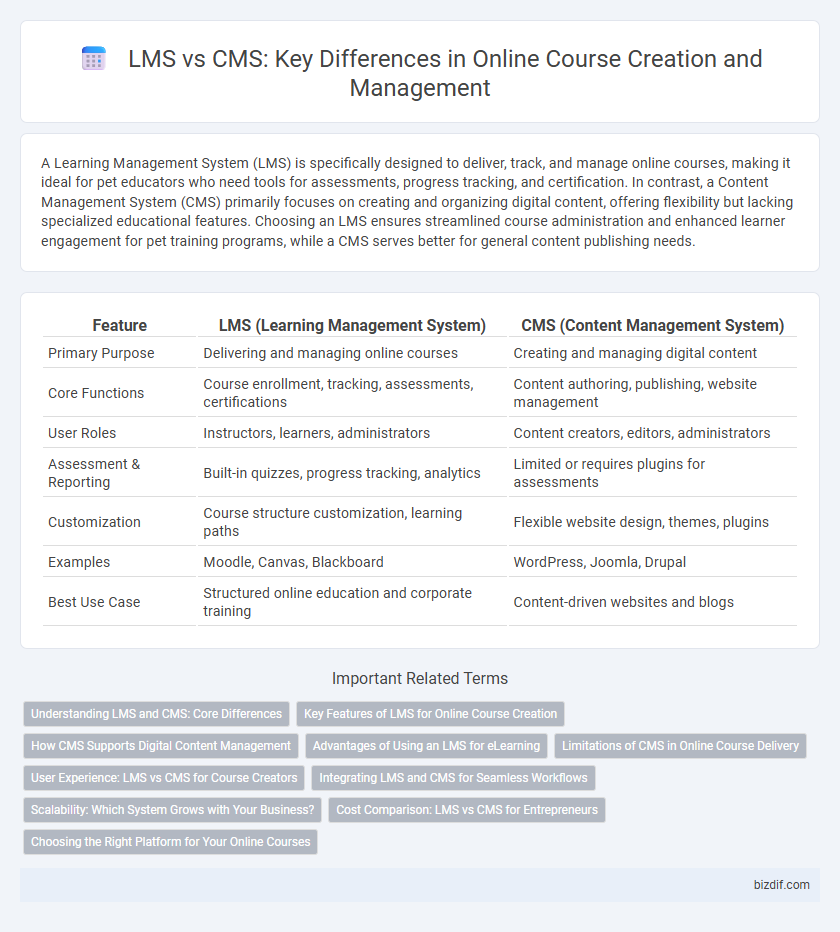A Learning Management System (LMS) is specifically designed to deliver, track, and manage online courses, making it ideal for pet educators who need tools for assessments, progress tracking, and certification. In contrast, a Content Management System (CMS) primarily focuses on creating and organizing digital content, offering flexibility but lacking specialized educational features. Choosing an LMS ensures streamlined course administration and enhanced learner engagement for pet training programs, while a CMS serves better for general content publishing needs.
Table of Comparison
| Feature | LMS (Learning Management System) | CMS (Content Management System) |
|---|---|---|
| Primary Purpose | Delivering and managing online courses | Creating and managing digital content |
| Core Functions | Course enrollment, tracking, assessments, certifications | Content authoring, publishing, website management |
| User Roles | Instructors, learners, administrators | Content creators, editors, administrators |
| Assessment & Reporting | Built-in quizzes, progress tracking, analytics | Limited or requires plugins for assessments |
| Customization | Course structure customization, learning paths | Flexible website design, themes, plugins |
| Examples | Moodle, Canvas, Blackboard | WordPress, Joomla, Drupal |
| Best Use Case | Structured online education and corporate training | Content-driven websites and blogs |
Understanding LMS and CMS: Core Differences
An LMS (Learning Management System) is designed specifically for delivering, tracking, and managing online education, featuring tools like course enrollment, progress monitoring, and assessments. A CMS (Content Management System) primarily handles content creation, storage, and publishing, focusing on website management without built-in educational functionalities. Choosing between LMS and CMS depends on whether the focus is on structured learning delivery or content publication and maintenance.
Key Features of LMS for Online Course Creation
LMS platforms offer key features tailored for online course creation, including course enrollment management, progress tracking, and interactive assessments that enhance learner engagement. They support multimedia content integration, automated grading, and certification, streamlining the instructional process. Unlike CMS, LMS systems provide comprehensive analytics and reporting tools essential for monitoring student performance and course effectiveness.
How CMS Supports Digital Content Management
CMS (Content Management System) enhances digital content management by providing intuitive tools for organizing, editing, and publishing course materials without requiring technical skills. It supports multimedia integration, version control, and collaborative content creation, making it easier to maintain up-to-date and engaging online courses. Unlike LMS, which focuses on learner tracking and assessment, CMS prioritizes efficient content workflow and seamless digital asset management.
Advantages of Using an LMS for eLearning
An LMS (Learning Management System) offers specialized features tailored for eLearning, such as course tracking, learner progress analytics, and assessment management, which a CMS (Content Management System) typically lacks. LMS platforms support interactive tools like quizzes, discussion forums, and certification issuance, enhancing learner engagement and retention. Centralized learner data and compliance reporting in an LMS streamline administrative tasks, making it a more efficient solution for structured online course delivery.
Limitations of CMS in Online Course Delivery
Content Management Systems (CMS) often lack the specialized features required for effective online course delivery, such as comprehensive learner tracking, assessment tools, and interactive engagement capabilities that Learning Management Systems (LMS) provide. CMS platforms are primarily designed for content storage and presentation, which limits their ability to facilitate structured learning paths, automate grading, or support synchronous and asynchronous communication between instructors and students. These limitations make CMS less suitable for delivering scalable, interactive, and pedagogically sound online education compared to dedicated LMS solutions.
User Experience: LMS vs CMS for Course Creators
LMS platforms like Moodle and Canvas offer course creators specialized tools for assessments, progress tracking, and interactive learning activities, enhancing user experience specifically for education. CMS platforms such as WordPress or Drupal provide greater flexibility in content presentation and website customization but often lack integrated educational features essential for course management. Choosing between LMS and CMS depends on the need for streamlined course delivery and student engagement versus broader content control and design versatility.
Integrating LMS and CMS for Seamless Workflows
Integrating a Learning Management System (LMS) with a Content Management System (CMS) streamlines online course creation by centralizing content storage and learning delivery. This integration enhances course management efficiency, allowing educators to update and distribute educational materials seamlessly within a unified platform. Combining LMS and CMS capabilities optimizes workflows, improves learner engagement, and supports scalable content updates for dynamic e-learning environments.
Scalability: Which System Grows with Your Business?
LMS platforms are specifically designed for scalable online course delivery, supporting increased user enrollment, advanced tracking, and interactive features essential for growing educational businesses. CMS systems lack these specialized learning tools and often require extensive customization to handle large-scale eLearning environments. Choosing an LMS ensures seamless expansion of course offerings, user management, and performance analytics as your online education business grows.
Cost Comparison: LMS vs CMS for Entrepreneurs
Choosing between LMS and CMS for online course creation significantly impacts expenses for entrepreneurs, with LMS platforms often requiring subscription fees ranging from $50 to $500 monthly based on features and user capacity. CMS solutions like WordPress offer more cost-effective options with free or low-cost plugins but may necessitate additional expenses for hosting, security, and course-specific integrations. Entrepreneurs must weigh upfront and ongoing costs, considering that LMS platforms provide specialized tools optimized for education, whereas CMS platforms offer greater flexibility at potentially lower costs but with increased setup efforts.
Choosing the Right Platform for Your Online Courses
Selecting the ideal platform for online courses hinges on understanding the core functions of LMS and CMS. LMS specializes in delivering, tracking, and managing e-learning programs, offering tools like quizzes, progress reports, and certification management, essential for structured education. In contrast, a CMS focuses on content creation and organization, optimal for hosting blogs or informational resources but limited in educational management features, making LMS the preferred choice for comprehensive online course delivery.
LMS (Learning Management System) vs CMS (Content Management System) Infographic

 bizdif.com
bizdif.com